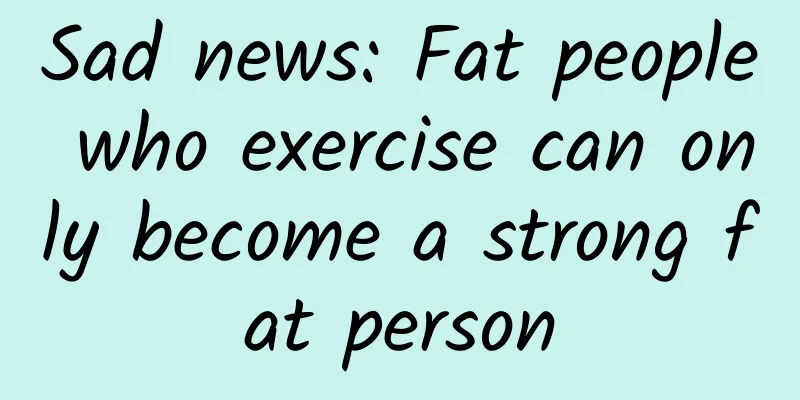Sad news: Fat people who exercise can only become a strong fat person

|
Spring is a season for losing weight. In order to lose weight before summer comes, many people have started to lose weight, such as running at night or going to the gym to exercise. However, after all the efforts, many people still scream when they see the numbers on the scale: "Why is my weight the same?" This is actually a dilemma that many people have encountered. Copyright images in the gallery. Reprinting and using them may lead to copyright disputes. Recently, researchers from the Chinese Academy of Sciences and an international team published a research paper titled "Energy Compensation and Human Obesity" online in Current Biology, proposing a key concept - energy compensation, which may be one of the important factors that lead to difficulty in losing weight. Too long to read: When activity levels increase, not all of the energy consumed translates into additional energy expended that day. During exercise, on average only 72% of the exercise is converted into additional calories burned that day, and the fatter the person, the lower the conversion rate. In other words, the fatter a person is, the harder it is to convert their exercise into extra calories burned that day, and the harder it is to lose weight. What is energy compensation? First, we need to understand what energy compensation is. In simple terms, energy compensation refers to a mechanism by which the human body naturally regulates energy expenditure after physical activity in order to protect itself from consuming too much energy. This sounds like a good protective mechanism, but when it comes to weight loss, it can become a hindrance. What is the specific compensation situation? According to this study, the research team used the largest dataset of total energy expenditure (TEE) and basal energy expenditure (BEE) for adults to date. The study found that in the absence of heavy physical labor and long-term food shortages, the participants' total energy expenditure (TEE) was proportional to their basal energy expenditure (BEE), while the energy expenditure of daily activities (AEE) was inversely proportional to their basal energy expenditure. That is, when we increase our daily activities (such as walking, running, etc.), our body will try to make up for the consumption of daily activities and reduce the basic energy consumption. Overall, our total daily energy consumption increase is lower than the energy consumption generated by the actual increased activities. For example, if the activity increases by 500 kcal, the total energy consumption only increases by about 360 calories (500 times 0.723). Image from reference [1]: Total energy expenditure (TEE) is directly proportional to basal energy expenditure (BEE), while energy expenditure from daily activities (AEE) is inversely proportional to basal energy expenditure. The study also found that energy compensation is mainly related to BMI, and has almost nothing to do with gender and age. The larger the BMI, the more energy compensation: for people with a BMI below the 10th percentile of the population, the energy compensation is 27.7%; for people with a BMI above the 90th percentile of the population, the energy compensation is 49.2%. Copyright images in the gallery. Reprinting and using them may lead to copyright disputes. This means that those with a higher BMI will have more energy compensation for the same amount of exercise, making it more difficult to lose weight. How does energy compensation occur? Energy compensation is one way our body uses to maintain energy balance. This ability is believed to be a protective mechanism that has been preserved over a long period of evolution. Especially during famine, it helps us conserve energy in the body to protect our reproductive capacity. This is a very practical survival strategy. Energy compensation is achieved through metabolic adjustments and behavioral changes. Metabolic adjustments involve lowering the resting metabolic rate and improving muscle efficiency by regulating catecholamine levels in the blood, enhancing the activity of the hypothalamic-pituitary-adrenal axis, reducing the activity of the hypothalamic-pituitary-thyroid axis, and optimizing the burning of fatty acids. These metabolic adjustments reduce our overall energy expenditure and also affect gene expression, thereby regulating lipid and carbohydrate metabolism. Behavioral adaptations include increased food intake and reduced active physical activity, achieved by changing the brain's perception of food and fluctuations in appetite-regulating hormones. So when you try to lose weight, your body senses the energy deficit and adjusts its metabolism and behavior to conserve more energy. As a result, heavier people retain more energy, making it more difficult to lose weight. How to break the dilemma of energy compensation when losing weight? When faced with the energy compensation challenges encountered during weight loss, understanding the principles behind them can help us develop strategies more effectively. For sports enthusiasts, increasing the amount of exercise is a good choice . A study in the United States found that overweight adults were divided into two groups, one group consumed 1500 kcal per week, and the other group consumed 3000 kcal. The results showed that consuming 3000 kcal per week can effectively reduce fat, exceeding the effect of energy compensation. We can also adjust our diet to counter energy compensation . A study of obese Australian men found that intermittent energy restriction (i.e., restricting energy intake during specific times and then allowing normal or more liberal eating at other times) was more effective than continuous energy restriction, which reduces caloric intake every day, and significantly increased weight loss efficiency and reduced fat mass. This may be because the "rest period" of energy balance interrupts energy restriction and reduces compensatory metabolic responses. Copyright images in the gallery. Reprinting and using them may lead to copyright disputes. Therefore, developing a personalized weight loss plan is key. Everyone's preferences, physical conditions, lifestyles, and energy compensation issues they face are different. Combining understanding your BMI and fitness level, and listening to professional advice from a health consultant or nutritionist can help design the most appropriate diet and exercise plan. In addition, long-term adherence to healthy lifestyle habits is the key to successful weight loss . Balanced diet, regular exercise, adequate sleep and effective stress management, these basic principles of health are the basis for sustained weight loss and maintaining ideal weight. This means that weight loss is not just a short-term goal, but requires long-term lifestyle adjustments. References [1]Careau V, Halsey LG, Pontzer H, et al. Energy compensation and adiposity in humans. Curr Biol. 2021;31(20):4659-4666.e2. [2]HM Hays, KD Flack. Energy Compensation with Exercise and Dietary-Induced Weight Loss. Journal of Clinical Exercise Physiology. 2021; 10(2): 51-61. [3]Flack KD, Ufholz K, Johnson L, Fitzgerald JS, et al. Energy compensation in response to aerobic exercise training in overweight adults. Am J Physiol Regul Integr Comp Physiol. 2018;315(4):R619-R626. [4]Byrne NM, Sainsbury A, King NA, et al. Intermittent energy restriction improves weight loss efficiency in obese men: the MATADOR study. Int J Obes (Lond). 2018;42(2):129-138. Planning and production Author: Jiang Yongyuan, Master of Internal Medicine, Third Military Medical University Reviewer: Dai Guangjiang, Chief Physician, Ergun People's Hospital Planning丨Fu Sijia Editor: Fu Sijia |
>>: What did Pluto do wrong to be "expelled" from the solar system?
Recommend
Baidu promotion plan, how many Baidu bidding SEM promotion plans are there?
Baidu promotion generally includes plans, units, ...
4 core methods for event operation and promotion
There are activities on today’s e-commerce platfo...
Compared with the 170,000-yuan Land Rover, the 90,000-yuan Corolla is the deafening death knell for joint venture car companies.
In this unprecedented wave of transformation in t...
Reservation time for the 19th Asian Games commemorative coins: When will they be issued in 2022? Where to make an appointment?
In more than 4 months, my country's 19th Asia...
In-depth interview with Yuanqi Forest and Heytea: How to create hot products through new marketing?
The timeline of 2020 is coming to an end, and the...
In-depth forecast for the second half of 2018 new media: growth panic, traffic depression
This article predicts the trends of new media in ...
How to write the copy for Qingming Festival?
When we think of Qingming What other associations...
How to use WeChat to increase APP downloads in 3 ways!
Entering the era of mobile Internet, various apps...
World Tiger Day丨The eternal question: Who will win in a fight between a tiger and a lion?
July 29th of every year is World Tiger Day. How m...
App operation: the most complete guide to launching APP products!
As an operator , the most basic work is to launch...
Guo Haipei's 2021 Palm Finance - 20 Lessons on Lone Wolf Strategy
Guo Haipei's 2021 Palm Finance - 20 Lessons o...
Summary of 8 years of operation practice, the core keywords of the operation knowledge system (with PPT and mind map download)
The Internet is an industry where you have to com...
Advertising case in wedding photography industry!
During the epidemic, the wedding photography indu...









